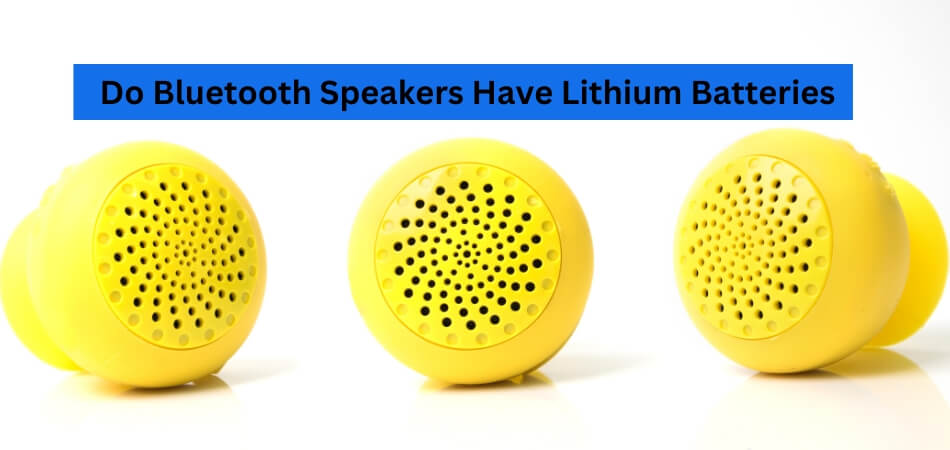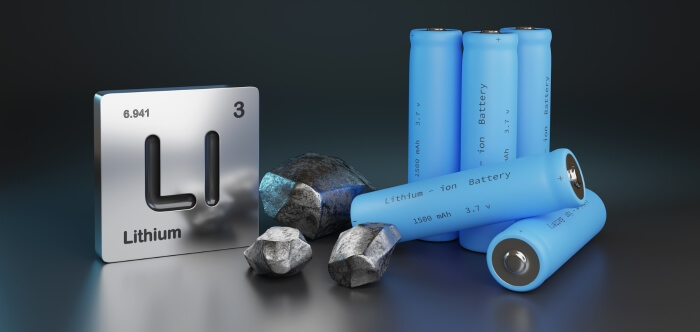The magic of Bluetooth speakers lies in their ability to deliver music wherever you go. They've become the go-to choice for portable sound, but have you ever wondered about the source of their power?
That leads to the question among different individuals: Do Bluetooth speakers have Lithium batteries? It's a question that takes us to the beating heart of these audio companions.
Yes, Bluetooth speakers commonly use rechargeable lithium-ion batteries. These batteries are renowned for their high energy density, featherweight design, and impressive longevity when it comes to maintaining a charge.
However, it's worth noting that the specific battery type can be as diverse as the speaker models. To uncover the precise power behind your Bluetooth speaker, a glimpse at the product specifications or a chat with the manufacturer can offer valuable insights. Join us in this exploration as we uncover the hidden energy within these modern marvels of sound.
What Bluetooth Speakers Are and How They Work?
Bluetooth speakers are portable devices that wirelessly connect to smartphones and other devices via Bluetooth technology. They offer features like portability, rechargeable batteries, and water resistance, making them ideal for outdoor and indoor use.

These speakers come in various types, including portable, home, outdoor, and smart speakers. Popular brands like Tiki Tunes, Bose, JBL, and Sony manufacture Bluetooth speakers, providing different user needs and budgets.
Bluetooth speakers have transformed personal audio, providing a convenient and wire-free way to enjoy music, podcasts, and calls, making them widely popular among consumers.
Do Bluetooth Speakers Have Lithium Batteries? [The Fact You Should Know]
Yes, many Bluetooth speakers use lithium batteries as their power source. Lithium batteries provide high energy density and compact size, making them ideal for portable devices like Bluetooth speakers. This technology ensures longer playtime and efficient performance in these devices.

What are Lithium Batteries?
Lithium batteries are advanced energy storage devices widely used in portable electronics, electric vehicles, and renewable energy systems. They employ lithium as a key component in their electrodes and electrolytes, enabling efficient ion movement during charge and discharge cycles.
Lithium batteries offer high energy density, providing extended usage in compact sizes. Their lightweight nature and low self-discharge rate make them ideal for various applications. However, proper handling and recycling are crucial due to safety concerns and environmental impact, emphasizing the need for responsible usage and disposal practices.
Significance of Lithium Batteries in Bluetooth Speakers
Lithium batteries play an important role in Bluetooth speakers, defining their portability and performance. Their lightweight and high-energy density make them ideal power sources, enabling speakers to deliver rich sound quality for extended periods.
Unlike traditional batteries, lithium batteries boast quick charging capabilities, ensuring minimal downtime. Additionally, they provide consistent power output, enhancing the speaker's efficiency. Their compact size allows for sleek speaker designs, catering to modern aesthetics.
With their durability and rechargeability, lithium batteries stand as the backbone of Bluetooth speakers, enabling users to enjoy immersive audio experiences anytime, anywhere.
What Makes Lithium Battery Different from Other Batteries?
Lithium batteries differ from other types of batteries in several key ways. Here are the key factors that make lithium batteries different from others:
- Energy Density: Lithium batteries have a higher energy density, meaning they can store more energy in a smaller and lighter package compared to other types of batteries like alkaline or nickel-cadmium batteries. This makes them ideal for portable devices.
- Voltage: Lithium batteries provide a higher voltage output, typically around 3.7 volts, compared to the 1.5 volts of alkaline batteries. This higher voltage often translates to better performance in electronic devices.
- Memory Effect: Unlike some other rechargeable batteries (like nickel-cadmium batteries), lithium batteries do not suffer from memory effects. Memory effect refers to the capacity loss that occurs when a battery is recharged before it has been fully discharged. Lithium batteries can be recharged at any state of charge without affecting their overall capacity.
- Self-Discharge Rate: Lithium batteries have a low self-discharge rate, meaning they lose their charge at a slower rate when not in use. This allows devices to retain power for a longer time even when not actively used.
- Lifecycle: Lithium batteries generally have a longer life cycle compared to other rechargeable batteries. They can withstand a higher number of charge-discharge cycles, making them more durable over time.
- Size and Weight: Lithium batteries are lightweight and come in various sizes and shapes, offering flexibility in design for electronic devices. They are commonly used in compact and portable gadgets due to their size advantage.
- Safety: While all batteries carry safety risks, lithium batteries are known for their stable chemistry and safety features. However, they can be hazardous if not handled properly, especially if they are damaged, punctured, or exposed to extreme temperatures.
Challenges You Might Face When Use Lithium Batteries on Your Bluetooth Speaker
The challenges you might face while using lithium batteries are the following:
- Heating Issues: Overheating affects safety and performance, requiring efficient thermal management systems.
- Limited Lifespan: Lithium batteries have a finite lifespan determined by charge cycles, necessitating efforts to extend longevity and reduce replacements.
What are the New Innovations and Future Prospects for Lithium Batteries?
Innovations in lithium batteries and their prospects are promising and diverse. Here are some of the upcoming innovations that might shape the future of Lithium Batteries:

- Solid-State Batteries: Research continues to enhance solid-state battery technology, offering improved safety, energy density, and longer lifespans compared to traditional lithium-ion batteries. These innovations pave the way for safer and more efficient energy storage solutions.
- Flexible and Wearable Batteries: Advancements are being made in developing flexible and wearable batteries, enabling new applications in smart textiles, medical devices, and flexible electronics. These batteries offer energy storage solutions for unconventional and bendable devices.
- Fast-Charging Technologies: Research is focused on developing faster-charging methods that reduce charging times significantly. This is essential for electric vehicles and portable electronics, providing users with quick and convenient charging options.
- High-Energy-Density Batteries: Scientists are exploring materials and technologies to increase the energy density of lithium batteries, allowing for longer usage between charges and more energy storage in smaller devices.
- Recycling and Sustainability: Innovations in battery recycling technologies are emerging, promoting a circular economy for lithium batteries. Sustainable practices, including recycling and responsible disposal, are becoming integral to the future of battery technology, reducing environmental impact.
- Integration with Renewable Energy: Lithium batteries are increasingly integrated into renewable energy systems, such as solar and wind power installations, to store excess energy and ensure a stable power supply even when renewable sources are intermittent.
- AI and Battery Management: Artificial intelligence (AI) and machine learning are being utilized for efficient battery management systems. These systems optimize charging and discharging processes, prolonging battery life and enhancing overall efficiency.
The future of lithium batteries lies in these innovations, addressing challenges, enhancing efficiency, and expanding their applications across various industries, from consumer electronics to renewable energy storage.
Conclusion
The evolution of portable technology, such as Bluetooth speakers, is linked to the remarkable advancements in lithium battery technology. These speakers, powered mostly by rechargeable lithium-ion batteries, express the fusion of innovation and practicality.
Lithium batteries, renowned for their high energy density and efficiency, are the lifeblood of these devices, ensuring extended playtime, quick recharging, and consistent power output.
As we delve into the future, the landscape of lithium batteries expands with innovations like solid-state batteries, flexible designs, and faster-charging technologies. Sustainable practices, recycling initiatives, and integration with renewable energy sources underscore the industry's commitment to eco-conscious progress.
Indeed, the question “Do Bluetooth speakers have lithium batteries?” reveals a narrative of continuous innovation and environmental responsibility, shaping a future where portable sound technology perfectly integrates with our lives.






